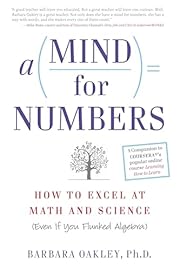

Click on a thumbnail to go to Google Books.
|
Loading... A Mind for Numbers: How to Excel at Math and Science (Even If You Flunked Algebra) (edition 2014)by Barbara Oakley PhD (Author)
Work InformationA Mind for Numbers: How to Excel at Math and Science (Even If You Flunked Algebra) by Barbara Oakley
 No current Talk conversations about this book. More of generic learning strategies + procrastination + study tips than Math/Science per se (though she ties back the points loosely to Math/Science). What it covers: • How your brain works and how you learn. Find out about the 2 modes of thinking (focused and diffuse), 2 key memory systems (short-term and long-term), and how they affect learning. • Various learning strategies, including distributed practice, deliberate practice, mixed practice, chunking, spaced retrieval, memory techniques, and how to apply them to Math/Science. • Additional strategies and tips to overcome procrastination and prepare for tests/exams. Book summary at: https://readingraphics.com/book-summary-a-mind-for-numbers/ This book does an excellent job of presenting useful info on learnign techniques and the underlying processes. The only issue (if being applicable to a wider range of subjects than ouright stated is a downside) is that the book frames everything strictly in terms of math and science, despite the fact that the advice it gives apllies to learning subjects in general. no reviews | add a review
Mathematics.
Self-Improvement.
Nonfiction.
HTML:The companion book to COURSERA®'s wildly popular massive open online course "Learning How to Learn" Whether you are a student struggling to fulfill a math or science requirement, or you are embarking on a career change that requires a new skill set, A Mind for Numbers offers the tools you need to get a better grasp of that intimidating material. Engineering professor Barbara Oakley knows firsthand how it feels to struggle with math. She flunked her way through high school math and science courses, before enlisting in the army immediately after graduation. When she saw how her lack of mathematical and technical savvy severely limited her options—both to rise in the military and to explore other careers—she returned to school with a newfound determination to re-tool her brain to master the very subjects that had given her so much trouble throughout her entire life. In A Mind for Numbers, Dr. Oakley lets us in on the secrets to learning effectively—secrets that even dedicated and successful students wish they’d known earlier. Contrary to popular belief, math requires creative, as well as analytical, thinking. Most people think that there’s only one way to do a problem, when in actuality, there are often a number of different solutions—you just need the creativity to see them. For example, there are more than three hundred different known proofs of the Pythagorean Theorem. In short, studying a problem in a laser-focused way until you reach a solution is not an effective way to learn. Rather, it involves taking the time to step away from a problem and allow the more relaxed and creative part of the brain to take over. The learning strategies in this book apply not only to math and science, but to any subject in which we struggle. We all have what it takes to excel in areas that don't seem to come naturally to us at first, and learning them does not have to be as painful as we might think. No library descriptions found. |
Current DiscussionsNonePopular covers
 Google Books — Loading... Google Books — Loading...GenresMelvil Decimal System (DDC)501.9Natural sciences and mathematics General Science Philosophy and theory PsychologyLC ClassificationRatingAverage: (3.9) (3.9)
Is this you?Become a LibraryThing Author. |
||||||||||||||||||||||||||||||||||||||||||||||||||||||||||||||||||||||||||||||||||||||||||||||||||||||||||||||||||||||||||||||||||||||
I'd recommend this to anyone studying Math, Computer Science, Physics, or other technical subjects (and have been actively recommending it to my coding bootcamp students). The book focuses on math, but the techniques apply elsewhere. (